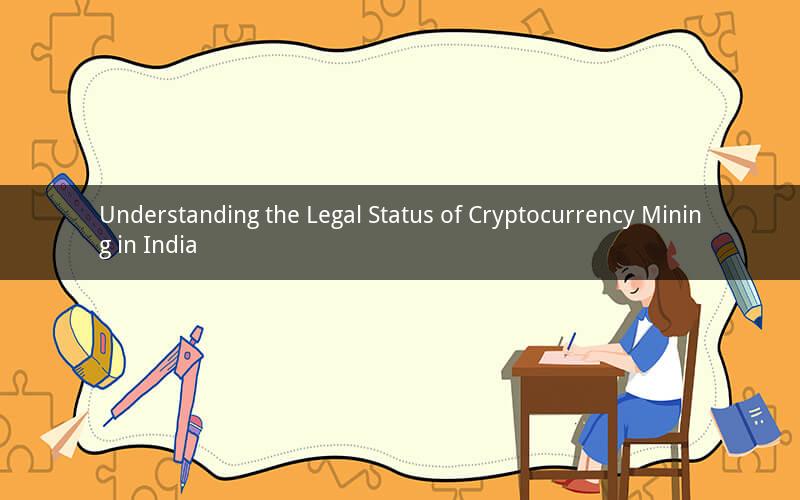
In recent years, the cryptocurrency market has witnessed significant growth and attention globally. As a result, many countries, including India, have been grappling with the legal implications of cryptocurrency mining. This article delves into the legal status of cryptocurrency mining in India, exploring the regulations, challenges, and implications for both miners and the country as a whole.
1. The Legal Framework of Cryptocurrency Mining in India
The legal status of cryptocurrency mining in India is a complex issue, primarily due to the ambiguity surrounding cryptocurrencies and their regulatory framework. As of now, there is no specific law in India that explicitly prohibits or legalizes cryptocurrency mining. However, various regulations and policies have been introduced to regulate the cryptocurrency market.
1.1. The RBI's Ban on Cryptocurrency Transactions
In April 2018, the Reserve Bank of India (RBI) issued a circular prohibiting all banks and financial institutions from providing services to any entity dealing with or settling Virtual Currencies (VCs). This decision was based on concerns regarding the lack of regulation, security, and potential risks associated with cryptocurrencies. While this ban does not explicitly target cryptocurrency mining, it restricts the financial services required for mining activities.
1.2. The Cryptocurrency and Regulation of Official Digital Currency Bill, 2021
In February 2021, the Indian government introduced the Cryptocurrency and Regulation of Official Digital Currency Bill, 2021 (Crypto Bill). The bill aims to regulate cryptocurrencies and create a legal framework for the country's official digital currency. While the bill does not explicitly address cryptocurrency mining, it suggests that the government is considering the issue and aims to establish a clear regulatory framework.
2. Challenges Faced by Cryptocurrency Miners in India
Despite the lack of explicit legal prohibition, cryptocurrency mining in India faces several challenges:
2.1. Regulatory Uncertainty
The ambiguity surrounding the legal status of cryptocurrency mining creates uncertainty for miners. Without clear regulations, miners are at risk of facing legal action or being denied access to essential financial services.
2.2. High Energy Costs
India is known for its high electricity rates, making it challenging for miners to operate profitably. Additionally, the lack of infrastructure to support large-scale mining operations adds to the cost.
2.3. Power Outages
India frequently experiences power outages, particularly in rural areas. This makes it difficult for miners to maintain consistent operations and poses a significant risk to their investments.
3. The Implications of Cryptocurrency Mining in India
3.1. Economic Growth
Cryptocurrency mining can contribute to economic growth by attracting investment, creating job opportunities, and promoting technological innovation. However, the lack of clear regulations hinders the potential growth of the industry in India.
3.2. Energy Consumption
Cryptocurrency mining is a highly energy-intensive process. The rapid growth of the industry has raised concerns about its impact on the environment and the country's energy resources.
3.3. Security and Privacy
The mining process involves solving complex mathematical problems, which requires significant computational power. This raises concerns about the security of sensitive data and the potential for cyber attacks.
Frequently Asked Questions (FAQs)
1. Is cryptocurrency mining illegal in India?
Answer: As of now, cryptocurrency mining is not explicitly illegal in India. However, the ambiguity surrounding the legal status and the RBI's ban on financial services for cryptocurrency-related entities create challenges for miners.
2. How does the RBI's ban affect cryptocurrency mining in India?
Answer: The RBI's ban restricts banks and financial institutions from providing services to entities dealing with cryptocurrencies. This makes it difficult for miners to access essential financial services, such as bank accounts, payment gateways, and remittances.
3. Can the government of India regulate cryptocurrency mining?
Answer: Yes, the government of India can regulate cryptocurrency mining. The introduction of the Crypto Bill suggests that the government is considering establishing a legal framework for cryptocurrencies and their associated activities, including mining.
4. What are the challenges faced by cryptocurrency miners in India?
Answer: Cryptocurrency miners in India face challenges such as regulatory uncertainty, high energy costs, and power outages. These factors make it difficult for miners to operate profitably and maintain consistent operations.
5. How can the Indian government promote the growth of the cryptocurrency mining industry?
Answer: The Indian government can promote the growth of the cryptocurrency mining industry by providing clear regulations, ensuring access to affordable energy, and improving the country's infrastructure. This will attract investment, create job opportunities, and foster technological innovation.